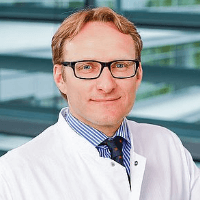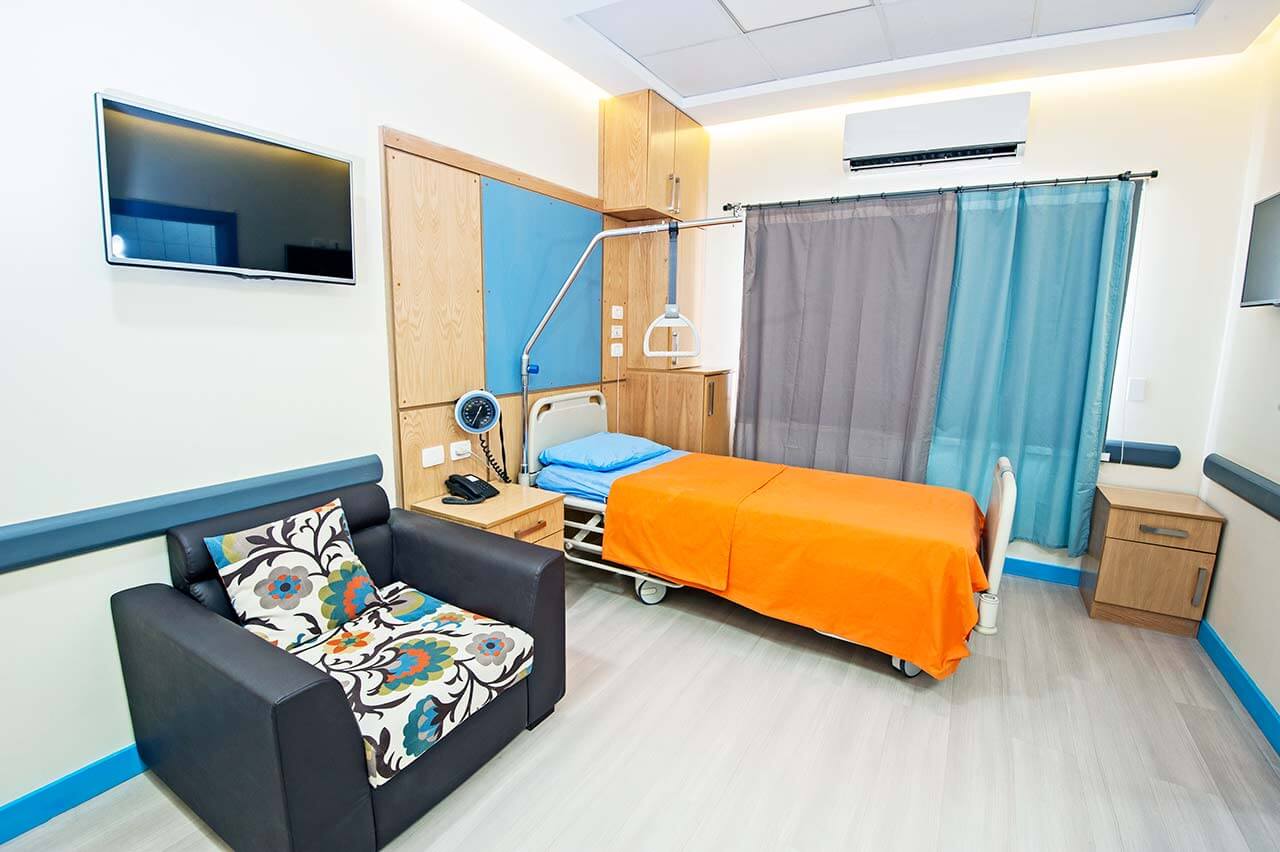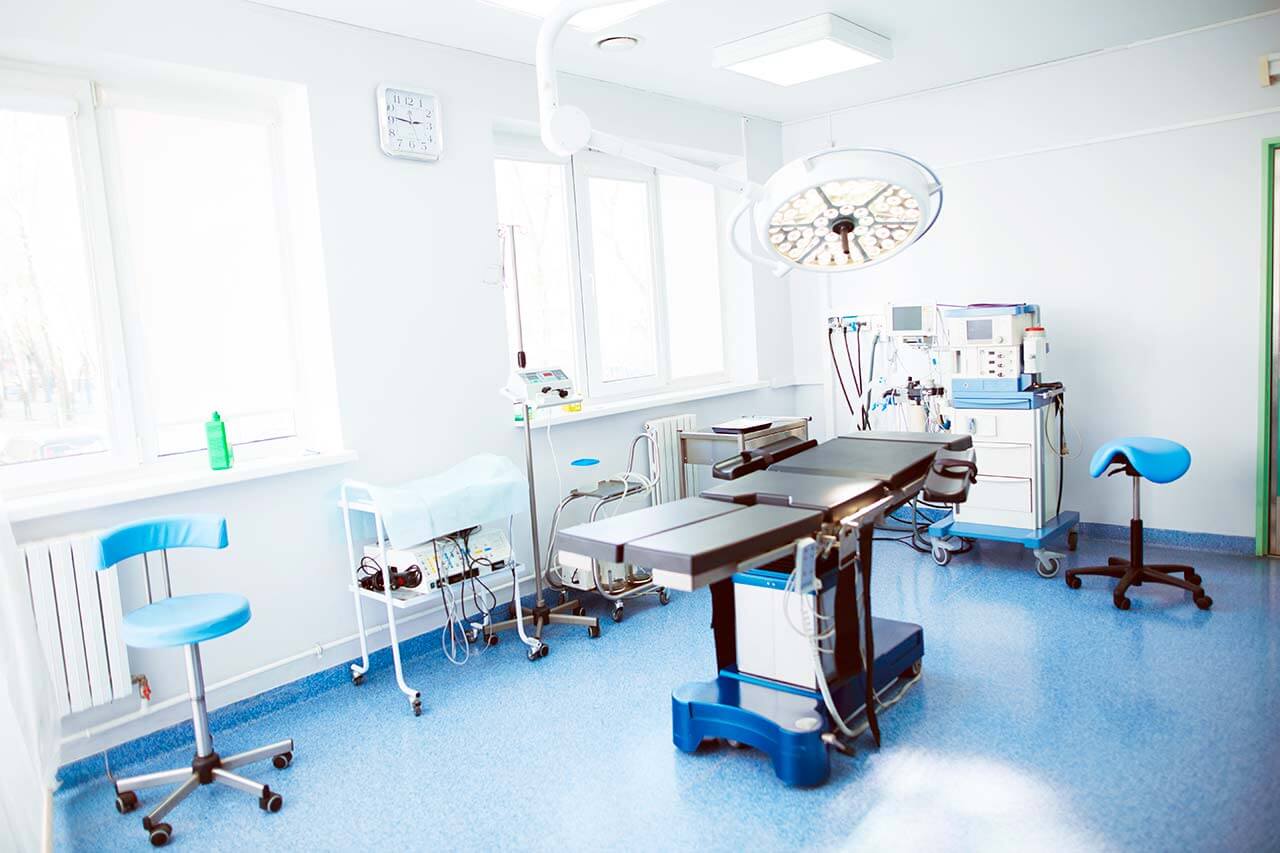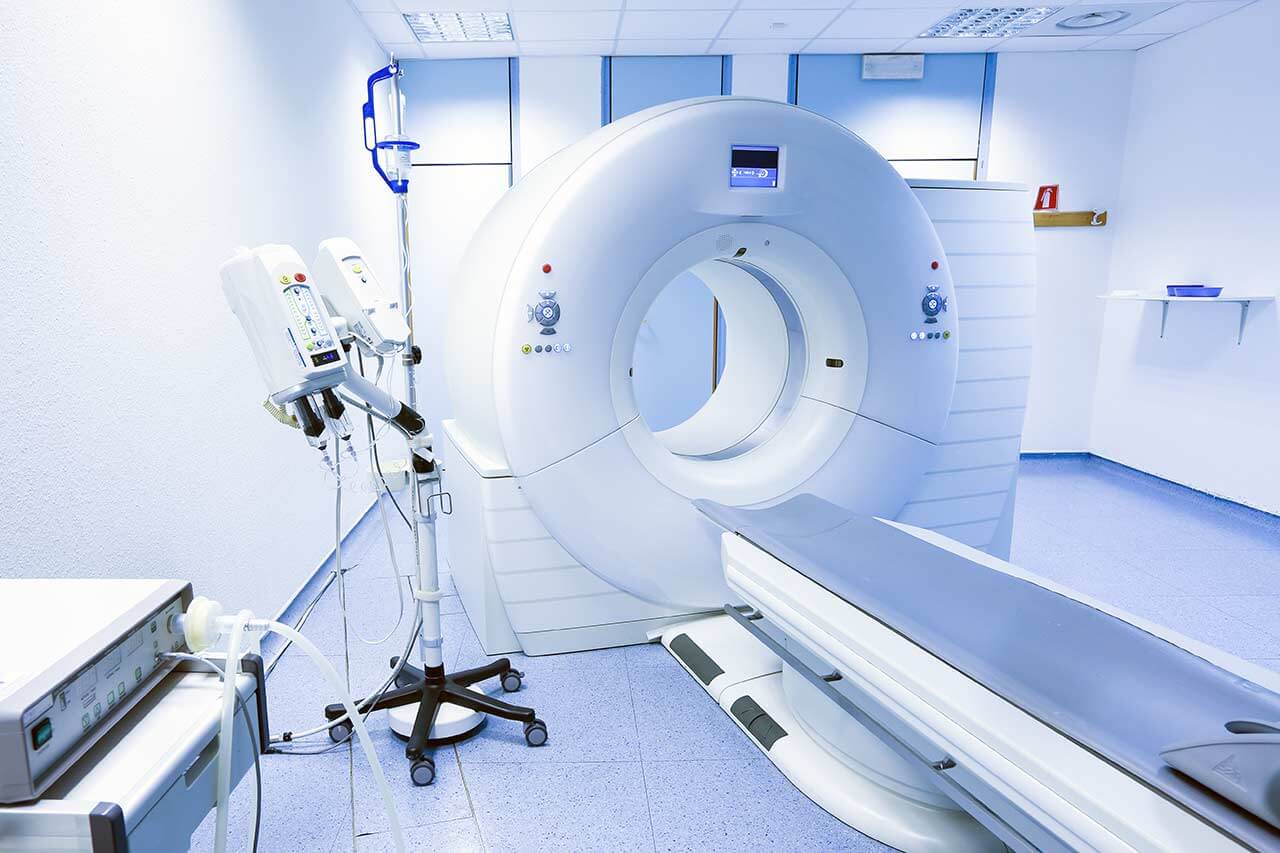
The program includes:
- Initial presentation in the clinic
- clinical history taking
- review of medical records
- physical examination
- laboratory tests:
- complete blood count
- general urine analysis
- biochemical analysis of blood
- TSH-basal, fT3, fT4
- tumor markers
- inflammation indicators (CRP, ESR)
- indicators of blood coagulation
- abdominal ultrasound scan
- CT scan/MRI or PET-CT of abdomen
- preoperative care
- cytoreductive surgery to remove visible tumors
inside the abdomen and HIPEC - histological and immunohistochemical
examination of removed tissues - symptomatic treatment
- cost of essential medicines
- nursing services
- stay in the hospital with a full board
- accommodation in a 2-bedroom ward
- elaboration of further recommendations
How program is carried out
During the first visit, the physician will conduct a clinical examination and go through the results of the available diagnostic tests. After that, you will undergo the necessary additional examination, such as the assessment of liver and kidney function, ultrasound scan and tomography of the abdominal organs. Based on the results of the examination, the physician will choose the surgical technique and the type of anesthesia. After that, preparation according to the preoperative standard will start.
Cytoreductive surgery begins with general anesthesia. The intervention is performed as open surgery, i.e. through the incision in the anterior abdominal wall, so that the surgeon can carefully examine the peritoneum and the surface of the abdominal organs. The surgeon removes affected by the malignant process ovaries, areas of the peritoneum and metastases in other internal organs. This stage of the operation can take several hours, since the overall effectiveness of the treatment depends on the completeness of the malignant tissues removal.
At the next stage of the operation, the surgeon inserts several catheters into the abdominal cavity. Through the catheters, a heated solution of a chemotherapy drug is pumped inside. The special system maintains the required temperature (42-43 degrees Celsius), pressure and circulation rate of the medicinal solution. The solution mechanically flushes out blood clots and remnants of malignant tissues, and a heated chemotherapy drug destroys micrometastases in internal organs and lymph nodes (micrometastases can’t be detected by the naked eye).
After 1-1.5 hours, the chemotherapy drug is removed from the abdominal cavity and the abdominal cavity is washed with saline. After that, the surgeon removes the catheters and sutures the incision of the anterior abdominal wall.
After the completion of the operation, you will be transferred to the ward of the intensive care unit, under the round-the-clock supervision of doctors and nurses. In 1-3 days after the operation, your drains will be removed and you will be transferred to a regular ward for further recovery. The whole treatment takes 10-12 days on average.
Finally, the attending physician will evaluate the results of control examinations, schedule the date of discharge from the hospital and give you detailed recommendations for further follow-up and treatment.
Required documents
- Medical records
- MRI/CT scan (not older than 3 months)
- Biopsy results (if available)
Service
You may also book:
 BookingHealth Price from:
BookingHealth Price from:
About the department
The Department of Gynecology, Mammology and Obstetrics at the Municipal Hospital Karlsruhe offers the full range of services in the areas of its competence. The medical facility provides diagnostics and treatment of diseases of the female reproductive system and breast pathologies. The therapeutic options are complemented by top-class obstetric services, including pregnancy management, childbirth and postnatal care for both mother and child. The department's doctors admit more than 5,000 inpatients and more than 5,000 outpatients annually. The department's specialists perform more than 3,500 surgical interventions annually, including highly complex ones. The department has been awarded prestigious quality certificates, including certificates from the German Cancer Society (DKG) in treating breast, cervical, ovarian, endometrial, vaginal and vulvar cancers. The department has a friendly atmosphere, and all conditions for maximum women's comfort are available here. Doctors are always open to dialogue with their patients and helping them. The Head Physician of the department is Prof. Dr. med. Andreas Müller.
Of particular interest to the department's doctors is gynecologic oncology. The specialization covers the treatment of malignant tumors of the vagina, vulva, cervix, endometrium and ovaries. During treatment, both standard regimens and innovative methods are used. The first-line therapy is usually surgical resection of the malignant tumor, which, depending on the clinical indications, can be supplemented with chemotherapy and/or radiation therapy. It should be noted that in many cases, doctors manage to perform laparoscopic tumor removal, contributing to a minimal risk of postoperative complications and rapid recovery after surgery. In addition, women who have cancer also receive competent psycho-oncological care.
The specialists in general gynecology treat hormonal disorders due to gynecological conditions, endometriosis, cervical dysplasia and uterine fibroids. These gynecological diseases are benign but can cause infertility and other severe problems and require appropriate treatment. First, the department's gynecologists consider drug therapy options; if diagnostic results indicate the need for interventional treatments, then a decision is made to perform a laparoscopic operation.
The department has successful experience in the treatment of vaginal and uterine prolapse and urinary incontinence. Doctors treat urinary incontinence using all modern drug treatments, conservative and surgical methods, depending on the specific clinical indications. Preference is always given to the most sparing treatment whenever possible. The surgical techniques used in the department include not only classical interventions through the vagina, but also minimally invasive reconstruction techniques using special meshes.
A key area of clinical practice is the treatment of benign and malignant breast pathologies, which is carried out in a specialized center certified by the German Cancer Society. With breast cancer suspected, a diagnostic examination is prescribed to the patient: mammography, breast sonography, biopsy, and others. Then, the clinical case will be considered at the tumor board, and the most effective treatment regimen will be developed. The range of breast cancer treatment options includes systemic therapy (chemotherapy and hormone therapy), radiation therapy, surgery, axillary lymph node dissection, and reconstructive interventions after mastectomy. After completing the course of treatment, the patient is recommended to undergo regular follow-up examinations for the prevention or early detection of breast cancer recurrence.
Obstetricians and specialists in perinatal medicine provide patients with comprehensive pregnancy management, safe childbirth and postpartum care. The department has excellent qualifications in the management of multiple pregnancies and high-risk pregnancies (Level I Perinatal Center). The course of pregnancy is controlled with modern methods of prenatal diagnostics, particularly ultrasound examinations using the latest equipment (under the requirements of the German Society for Ultrasound in Medicine DEGUM). Thus, many disorders can be detected even at the intrauterine development stage, allowing the doctors to quickly and effectively eliminate them.
About 2,300 babies are born in the department every year. A team of experienced obstetricians is available in the department around the clock. Childbirth takes place in modern delivery rooms equipped with all the necessary aids. It is also possible to give birth in water. Acupuncture, aromatherapy, homeopathy, and epidural anesthesia relieve pain. C-section is carried out using the modern sparing Misgav-Ladach technique.
The department's range of medical services includes:
- Gynecology
- Diagnostics and treatment of gynecologic cancers
- Cervical cancer
- Endometrial cancer
- Ovarian cancer
- Vulvar cancer
- Vaginal cancer
- Diagnostics and treatment of benign gynecologic diseases
- Cervical dysplasia
- Endometriosis
- Uterine fibroids
- Urinary incontinence
- Pelvic organ prolapse
- Female infertility caused by gynecological pathologies
- Diagnostics and treatment of gynecologic cancers
- Mammalogy
- Diagnostics and treatment of benign breast changes and breast cancer
- Obstetrics
- Prenatal diagnostics
- First trimester screening
- Second trimester screening
- Third trimester screening
- 3D/4D imaging
- Invasive diagnostics
- Chorionic villus biopsy
- Amniocentesis
- Cordocentesis
- Special consultations (for example, for expectant mothers with diabetes mellitus and for multiple pregnancies)
- Childbirth, including water births
- C-section using the modern sparing Misgav-Ladach technique
- Pain management during childbirth: acupuncture, aromatherapy, homeopathy, and epidural anesthesia
- Bonding
- Prenatal diagnostics
- Other diagnostic and therapeutic options
Curriculum vitae
Clinical Focuses
- Gynecologic oncology.
- Special obstetrics and perinatal medicine.
- Endocrinology and reproductive medicine.
Memberships in Professional Societies
- Medical Association of Baden-Wuerttemberg.
- Professional Association of Gynecologists.
- German Society of Ultrasound in Medicine (DEGUM).
- German Society of Endocrinology (DGE).
- German Society of Gynecology and Obstetrics (DGGG).
- German Cancer Society (DKG).
Photo of the doctor: (с) Städtisches Klinikum Karlsruhe
About hospital
The Municipal Hospital Karlsruhe is a modern maximum care medical facility, which combines a long tradition and the advanced achievements of modern medicine. The hospital operates on the basis of the University of Freiburg, so scientific innovations in the field of diagnostics and treatment are continuously introduced into practice here. The hospital presents almost all areas of modern medicine, including many medical services for young patients.
A highly qualified and experienced team of more than 4,500 employees provides impeccable medical care. The medical facility has 1,571 beds for the hospitalization of its patients. The hospital admits more than 63,000 inpatients and about 186,000 outpatients annually. A large number of patients wishing to receive medical care in the hospital speak for themselves and are a confirmation of the exceptional service, as well as the effectiveness of the treatment provided.
The quality management system of the hospital's medical care is certified in accordance with the DIN EN ISO 9001 standards. Since 2016, the hospital has implemented a regular quality control in compliance with the strict standards of the Initiative Quality Medicine (IQM). In addition, almost all departments of the hospital have numerous certificates in their areas of specialization, including certificates from the German Cancer Society (DKG), the German Society for General and Visceral Surgery (DGAV), the German Cardiac Society (DGK), the German Diabetes Society (DDG), the German Society of Nephrology (DGN), the German Trauma Society (DGU), etc.
The main value of the hospital's staff is the health and satisfaction of their patients, so a respect and a humane attitude towards each patient remain priorities. The doctors and nursing staff support each patient in every possible way on their path to recovery. The specialists also strive to perform the most sparing, but at the same time the most effective and safe treatment.
Photo: (с) depositphotos
Accommodation in hospital
Patients rooms
The patients of the Municipal Hospital Karlsruhe live in cozy patient rooms with everything necessary for a comfortable stay. Standard patient room furnishing includes an automatically adjustable bed, a bedside table, a TV, and a telephone. The patient rooms have Wi-Fi. Each patient room also has an ensuite bathroom with a shower and a toilet.
The patient rooms in the pediatric departments are specially designed for children, so that young patients feel at home. Children can live in their patient room with one of their parents. There are also special playrooms designed for children.
Meals and Menus
The patients of the hospital are offered tasty and varied three meals a day: breakfast, lunch and dinner. The menu also features dietary meals. The kitchen staff will gladly accept all the individual wishes of patients.
The hospital also has a cozy cafe where one can have a tasty snack, drink tea, coffee and soft drinks.
Further details
Standard rooms include:
Religion
The hospital has two chapels that regularly host Protestant, Catholic, and Ecumenical worship services. A patient can watch the broadcast of the worship on TV channels in his own room, if desired.
Accompanying person
Your accompanying person may stay with you in your patient room or at the hotel of your choice during the inpatient program.
Hotel
You may stay at the hotel of your choice during the outpatient program. Our managers will support you for selecting the best option.





